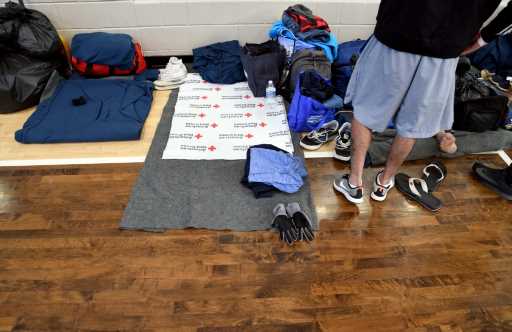Refugees in Colorado need shelter, jobs – opinion
Denver Mayor Michael Hancock is correct that the city cannot indefinitely house roughly 1,100 refugees, most from Venezuela, in recreation centers and partner emergency shelters. And it’s possible the number of refugees arriving in Denver may swell.
However, the brief time when these destitute individuals are in contact with authorities is an opportunity for officials, whether state or local, to set them up for as much success as possible in a country that has almost entirely ignored their pleas for humanitarian aid and deemed their very existence illegal.
We worry 14 days will not be enough time, as did the refugees we talked to, who are aware of the new deadline set by Hancock.
The city has done an incredible job processing the refugees as they have arrived by bus. The recreation centers serving as shelters, one of which The Post toured on Wednesday, are well run, offering humane living and sleeping conditions and giving people access to basic resources like clothing, hygiene products, and information about the bus system. But people are sleeping on the hard floor with mats and blankets. It is not a long-term solution.
Every day additional refugees are arriving in Denver. While some will leave, we know that many do not have friends or family elsewhere in America and will make Colorado their new home. We applaud Gov. Jared Polis’ decision to stop chartering buses to take the immigrants to other cities.
Three men interviewed by The Post’s opinion editor at a 7/11 on Federal Boulevard (their names are being withheld to prevent adverse immigration outcomes) expressed a desire to stay in Denver and repeatedly asked for work. The men traveled here on foot and by train across seven countries: Colombia; through the jungle in Panama, where they witnessed many deaths, including of young children; Costa Rica; Nicaragua; Honduras; El Salvador, and Mexico. They know no one in America and chose Denver because of our reputation for immigrant-friendly policies.
The oldest of the three men, who is 30, said the two months they waited at the border in Mexico were the hardest as there was no food and no humanitarian aid, unlike in other countries they passed through. Two of the men left their children behind in Venezuela with the hope of sending money home. The other man is from Colombia.
The 30-year-old form Venezuela said that under the dictator Nicolás Maduro his country had become dangerous and gun violence frequent. Even though he was working, his family did not have enough to eat, despite food boxes distributed by the government in an attempt to prevent starvation.
How can we as a city support these individuals and the thousands like them?
We have some not-that-radical ideas.
Across Europe, when refugees fled Ukraine in fear for their lives from the dangerous Russian tyrant Vladimir Putin, families welcomed the homeless with open arms. In Switzerland, this housing of refugees was officially managed by the government. The Swiss were asked to volunteer if there was space in their home. In the summer, there was fear that host families were running out of patience and may displace refugees, but those reports proved unfounded.
Between March and November, the country – known for its extremely strict immigration laws and harsh deportations of Syrian and Eritrean nationals – took in approximately 67,000 Ukrainians.
Lawmakers in Switzerland passed laws to fast-track work permits and other necessary aid for Ukrainians and then extended those laws into 2024. Ukrainian refugees are guaranteed access to temporary housing, social assistance, and medical care. In addition, the Swiss army provided 9,000 beds.
We’ve honestly given up hope that America’s Congress could ever function in such a helpful way, given the hostility from Republicans to refugees and the unwillingness of some Democratic moderates to be labeled as supporters of open borders and amnesty in elections.
President Joe Biden did the right thing by giving Venezuelans temporary protected status – essentially an 18-month waiver so they could live and work in the U.S. legally – and extending it in 2022. But as we learned when President Donald Trump took office and unilaterally revoked TPS from 300,000 people who had lived here for years, even decades, TPS is a stopgap that can leave families in the lurch. Additionally, Venezuelans who arrived after March 8, 2021, have missed the window to apply for TPS.
Asylum is their only option, and that is a tenuous prospect, at best.
The reality is that the refugees arriving in America will subsist off of jobs that are technically illegal and grossly underpaid. Many will pay taxes despite the risk but not all. This is unfortunate as America has record-low unemployment, and businesses across the state are struggling to find employees. These men, women, and children have not walked thousands of miles and risked their lives so they could live in poverty in America. They are not drug addicts or beggars. They are not scary or dangerous.
If the refugees seek asylum, in theory, they will be issued temporary work permits while their cases are adjudicated, but the asylum system is so broken that we cannot blame these refugees for not opening asylum cases out of fear of deportation.
Our federal government has failed these refugees, but Coloradans can make up for its ineptitude by providing food and shelter and, eventually if Congress can find the political courage, jobs.
Sign up for Sound Off to get a weekly roundup of our columns, editorials and more.
To send a letter to the editor about this article, submit online or check out our guidelines for how to submit by email or mail.
Source: Read Full Article

